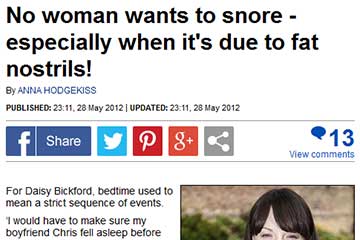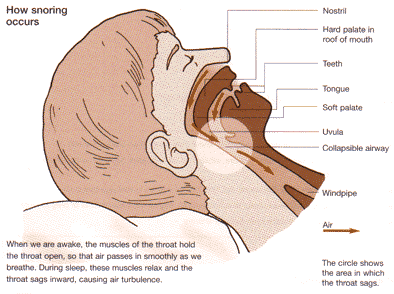
Snoring Consequence and Treatments Discussed in the Daily Mail
SNORING & BLOCKED NOSE
Daily Mail
No woman wants to snore – especially when it’s due to fat nostrils!
For Daisy Bickford, bedtime used to mean a strict sequence of events.
‘I would have to make sure my boyfriend Chris fell asleep before me, otherwise I’d keep him awake half the night with my snoring,’ says the 28-year-old accountant.
‘My sister used to say I sounded like a freight train,’ said Daisy Bickford
‘As it was, he rarely got a lie-in because of it. Most weekends he would get up and go for a run rather than lie there listening to me.’
Chris wasn’t the only person who avoided her snoring.
‘I’ve been snoring since my early teens and over the years it’s been rather embarrassing,’ says Daisy, who lives in East London.
‘Fortunately, Chris and I have been together for a long time so I am not as embarrassed as I could be, but no girl wants to snore.
‘The problem was more that any time I went away with friends — be it a girls’ weekend or even as far back as school trips — no one would want to share a room with me.
‘My sister used to say I sounded like a freight train. I would sometimes wake myself up, too, struggling to breathe because my nose was so blocked.’
Though snoring is traditionally considered something that affects middle-aged men, experts say many women fail to realise they have the condition — or the health implications it may have.
‘Women in particular do not like to think they snore — there’s a stigma attached to it — yet they account for 40 per cent of snorers,’ says Dr Martin Allen, consultant physician at the University Hospital of North Staffordshire, and spokesperson for the British Lung Foundation.
‘It can affect women of any age, though it is more common after the menopause.’
Snoring has been linked with a slightly increased risk of high blood pressure, high cholesterol and stroke.
It’s often a symptom of a serious sleep disorder called sleep apnoea, which can have devastating health implications if left untreated.
‘I would have to make sure my boyfriend Chris fell asleep before me, otherwise I’d keep him awake half the night with my snoring,’ said Daisy
Sleep apnoea affects up to 4 per cent of the adult population, but it’s been estimated that fewer than 10 per cent of those affected get treatment.
Women of any age can be affected, but it is often linked to health changes in pregnancy or menopause.
‘Sleep apnoea is certainly becoming a more common problem in young women due to the increasing incidence of obesity,’ says Alasdair Mace, who is an ear, nose and throat specialist and head and neck surgeon at Charing Cross and St Mary’s Hospitals in London.
The condition has been linked to heart failure and type 2 diabetes.
‘It’s thought sleep apnoea puts the body into fight or flight mode and encourages the release of hormones and chemicals in the blood that may trigger these conditions,’ says Dr Allen.
‘That’s why it’s so important to get treatment if you have sleep apnoea.
‘There is evidence to show people who didn’t receive treatment for this condition had an increased risk of heart attack compared to those who did. And these hormones can lead to a sustained increase in blood pressure.’
Daisy had part of the turbinate tissue lasered away to reduce blockages in her nose
And just last week U.S. research linked sleep apnoea to a five-fold increased risk of cancer.
That’s because snoring can deprive the body of sufficient oxygen.
Scientists believe low blood oxygen levels may trigger the development of cancerous tumours — the body produces more blood vessels to overcome low oxygen levels, which may feed the tumours.
In sleep apnoea, obstruction is caused by the muscles and soft tissues in the throat relaxing and collapsing so much they cause a total blockage.
Any factors that narrow the airway — such as having big tonsils — can increase this risk.
One key symptom of obstructive sleep apnoea is snoring, but what is worse is that the patient stops breathing frequently.
The lack of oxygen causes them to wake up briefly in order to restore normal breathing. As a result, sleep can be fragmented.
‘Sleep apnoea is characterised by loud snoring and pauses in breathing,’ says Dr Allen.
‘Some people may wake themselves up several times a night. Obviously if your sleep is disturbed that much you are likely to feel lethargic, irritable, miserable and suffer from headaches.
‘A common occurrence is partners saying the snorer is excessively sleepy and irritable the next day.’
But what about the link with cancer? In the new research, to be published in the American Journal of Respiratory and Critical Care Medicine, researchers examined cancer rates in more than 1,500 people over 22 years.
They found those with severe sleep disordered breathing were 4.8 times more likely to develop cancer than those with no such problems.
‘This is interesting information, but it’s rather like the saying “One swallow doesn’t make a spring,” ’ says Dr Allen.
‘If there was such an obvious link then we would have known about it by now, as we have known about sleep apnoea for 40 years.’
Snoring has been linked with a slightly increased risk of high blood pressure, high cholesterol and stroke
Other new research has found that women in particular are more likely to put off seeking help because they are so embarrassed about their condition.
The survey, by ResMed, which manufactures sleep apnoea equipment, estimates 378,000 women in the UK suffer from undiagnosed sleep apnoea.
Despite all the women in the survey declaring their everyday lives to be affected by their snoring, none said they would visit their GP to discuss the problem.
Furthermore, most did not see snoring as a health problem.
In Daisy’s case, it wasn’t sleep apnoea but enlarged turbinates — a condition that affects many thousands of Britons without them realising it.
These are the bits of bone covered by soft tissue just inside the nose where the nostril flares out; they help to filter and warm air in the nose, and to trap dirt and dust particles.
Most of the time we’re not aware of them, but when they become enlarged it can make breathing through the nose almost impossible and triggers snoring, says Myles Black, consultant head, neck and thyroid surgeon at East Kent Hospitals University NHS Foundation Trust and The Private Clinic in London.
‘Turbinates may become enlarged due to an allergy (which causes inflammation of the tissue around the bone making it ‘fat’) or irritation such as that from cigarette toxins.’
Daisy doesn’t know what caused her condition, but found that as well as snoring it was more difficult to breathe during exercise.
She confesses that for her, snoring had mainly been an inconvenience — she had no idea it could potentially affect her health in the future.
‘I had known for a few years I had enlarged turbinates after my GP referred me to an ear, nose and throat specialist, but I just hadn’t got around to doing anything about it.’
Daisy saw Mr Black, who lasered away part of the turbinate tissue to reduce blockages in her nose.
‘I had the surgery under local anaesthetic,’ she says.
‘It took less than half an hour, I didn’t need any time off work and I noticed the results straight away.
‘It was quite painful, but I was given more anaesthetic to deal with that. Six weeks on, I barely snore and I am breathing through my nose much easier.
‘I’m definitely sleeping better and Chris is obviously very pleased, too.
‘I just wish I had got treatment earlier.
‘I didn’t know snoring was something that could have health implications long-term; it’s not something you think about when you are in your 20s.’
For more information, visit the British Lung Foundation at www.lunguk.org and the Sleep Apnoea Trust at www.sleep-apnoea-trust.org





